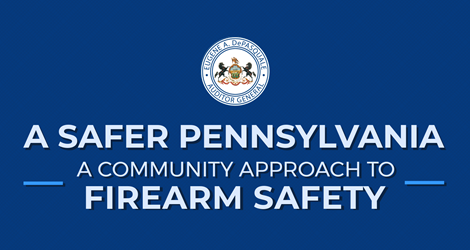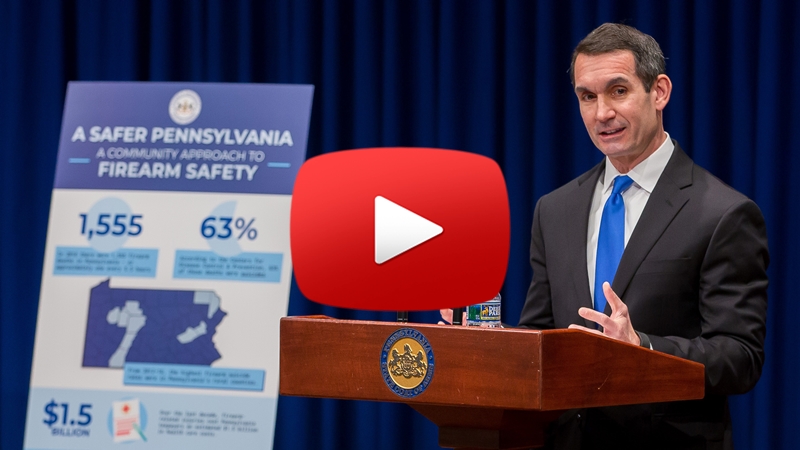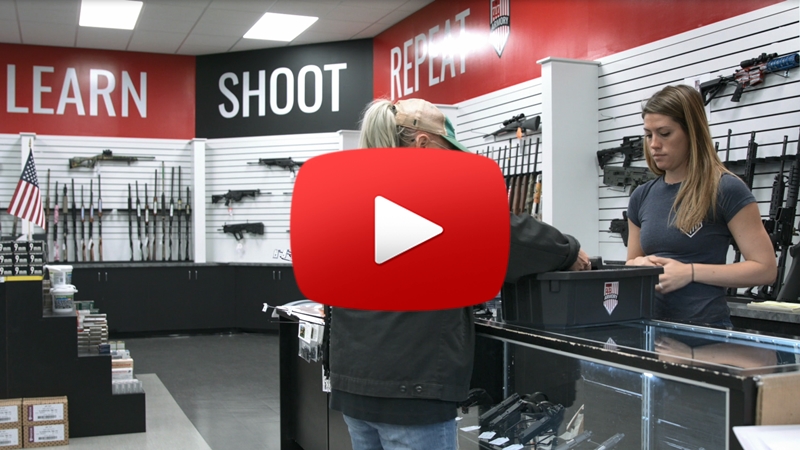Auditor General DePasquale Releases Firearm Safety Special Report, Calls for Community Approach to Making Pennsylvania Safer
Report highlights ways to achieve commonsense goals, curb violence, save lives
Auditor General DePasquale Releases Firearm Safety Special Report, Calls for Community Approach to Making Pennsylvania Safer
Report highlights ways to achieve commonsense goals, curb violence, save lives
HARRISBURG (Nov. 27, 2018) – Calling for a community approach to saving lives, Auditor General Eugene DePasquale today released his special report on firearm safety outlining new ways in which Pennsylvania can curb deaths and injuries without changing existing laws.
“We cannot continue to sit idly by while so many Pennsylvanians are killed or injured,” DePasquale said. “More than 1,500 Pennsylvanians died as a result of firearms in 2016 – on average, that’s four funerals held every day.
“Beyond the tragic human toll, firearm-related violence carries enormous costs to society,” he added. “Over the last decade, firearm-related injuries cost Pennsylvania taxpayers about $1.5 billion in health care costs because 76 percent of shooting victims were either uninsured or publicly insured.”
To prepare the report, DePasquale sought input from groups and individuals reflecting a broad range of perspectives, including sporting groups, safety advocates, law enforcement, medical and mental health practitioners, firearm dealers, and domestic violence prevention advocates, among others.
He noted that a unifying theme of the feedback he received was a desire to have a discussion rooted in collaboration, putting aside fear-driven rhetoric and finger-pointing.
“Having a civil discussion about firearms has become difficult in today’s polarized political environment, but we all must start talking and listening to each other,” DePasquale said. “When we talk and listen, it becomes clear that we can find common ground – and that’s a giant step toward finding solutions.”
DePasquale said mass shootings, such as the one that claimed 11 lives at the Tree of Life Synagogue in Pittsburgh in late October, point to the need for a greater focus on the availability of mental health services as a means of prevention.
“Although mass shootings attract the most media attention — and understandably so — such crimes account for less than 1 percent of all Pennsylvania firearm fatalities annually,” DePasquale said. “Of the more than 1,500 lives lost statewide in 2016, nearly two-thirds died by suicide.”
DePasquale’s report, “A Safer Pennsylvania: A Community Approach to Firearm Safety,” contains 12 recommendations:
- The state should work to expand access to mental health care, especially in rural communities.
- The stigma of seeking mental health help must end; to do that, the state should mount a culturally responsive public awareness campaign.
- Engage medical doctors and train all physicians, especially primary care physicians, to screen patients for risks of firearm violence.
- Engage licensed firearms dealers in looking for red flags in customers who might potentially use a firearm for suicide.
- The Pennsylvania Game Commission should expand its hunter education program section on firearm safety and create a voluntary training program on safe firearm usage and storage.
- Encourage all firearm owners to voluntarily use safe storage best practices, such as locking unloaded firearms in a safe and storing ammunition away from firearms.
- The state should continue to support hospital-based violence intervention programs and behavioral health resources in hospitals so they can be fully responsive to the violence they treat and ensure that unresolved trauma will not contribute to retaliation or suicide.
- The state should support communities in organizing violence prevention efforts proven to be effective. The Pennsylvania Commission on Crime and Delinquency’s Gun Violence Reduction Initiative is a good example of that support.
- The governor should sign an executive order requiring Pennsylvania State Police to issue quarterly and monthly reports on firearms traced from crimes to help track lost and stolen guns as well as firearm-related criminal activity.
- The state should secure funding to increase Pennsylvania’s participation in a national network that uses bullets to connect multiple crimes to single firearms.
- Sheriffs and other law-enforcement officials who issue concealed-carry permits should thoroughly check applicants’ references and backgrounds before approving applications and consider prosecuting those who provide false information.
- Pennsylvania State Police should implement the Lethality Assessment Program, which connects victims of intimate partner violence to local domestic violence programs, statewide.
DePasquale reiterated that none of his proposals would impact the constitutional rights of firearms owners, further reflecting his desire to work within existing laws.
“Misuse of firearms is a problem that affects not only those who are shot, but the communities to which they belong,” he concluded. “It all boils down to this: too many people are being hurt and killed with firearms, and only by working together can we end the carnage.”
To review the special report on firearm safety, visit www.paauditor.gov.
# # #
Return to search results

